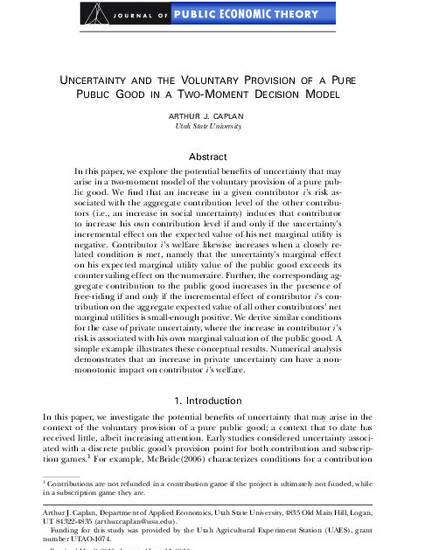
Article
Uncertainty and the Voluntary Provision of a Pure Public Good in a Two-Moment Decision Model
Journal of Public Economic Theory
(2016)
Abstract
In this note we explore the potential benefits of uncertainty that may arise in a two-moment model of the voluntary provision of a pure public good. We find that an increase in a given contributor i’s risk associated with the aggregate contribution level of the other contributors (i.e., an increase in social uncertainty) induces that contributor to increase his own contribution level if and only if the uncertainty’s incremental effect on the expected value of his net marginal utility is negative. Contributor i’s welfare likewise increases when a closely related condition is met, namely that the uncertainty’s marginal effect on his expected marginal utility value of the public good exceeds its countervailing effect on the numeraire. Further, the corresponding aggregate contribution to the public good increases in the presence of free-riding if and only if the incremental effect of contributor i’s contribution on the aggregate expected value of all other contributors’ net marginal utilities is small-enough positive. We derive similar conditions for the case of private uncertainty, where the increase in contributor i’s risk is associated with his own marginal valuation of the public good. A simple example illustrates these conceptual results. Numerical analysis demonstrates that an increase in private uncertainty can have a non-monotonic impact on contributor ’s welfare.
Keywords
- public good; social uncertainty; private uncertainty; voluntary provision
Disciplines
Publication Date
Fall November 3, 2016
Citation Information
Arthur J. Caplan. "Uncertainty and the Voluntary Provision of a Pure Public Good in a Two-Moment Decision Model" Journal of Public Economic Theory Vol. 18 Iss. 6 (2016) p. 910 - 922 Available at: http://works.bepress.com/arthur_caplan/120/
